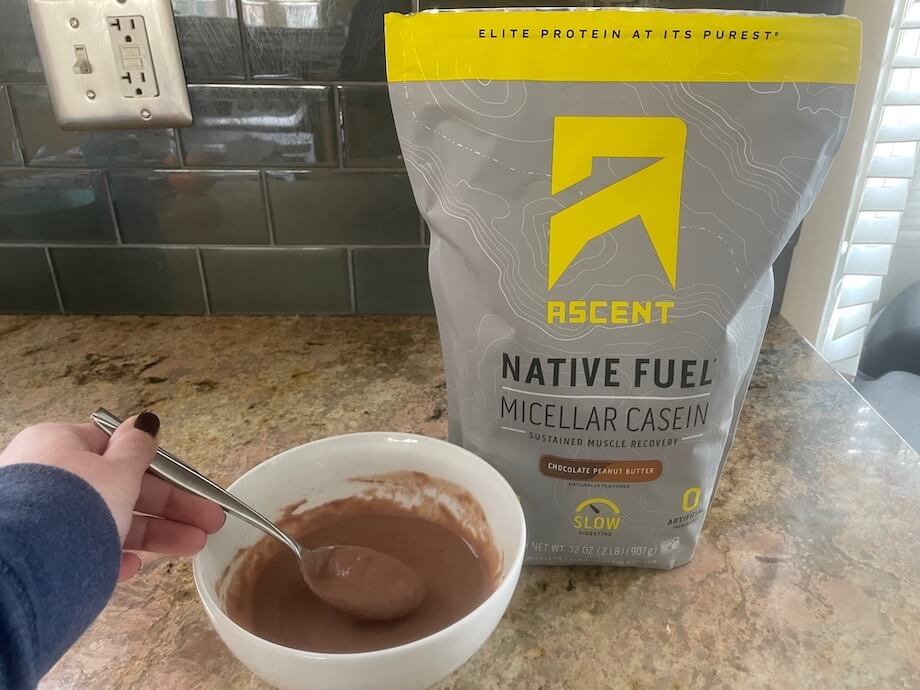Without even realizing it, you were likely introduced to casein protein well before stocking your supplement stash with the best casein protein powders. Casein might’ve been presented to you before you were even walking, thanks to the nursery rhyme “Little Miss Muffet.”
Because you know the curds and whey Little Miss Muffet ate while sitting on a tuffet? Mmhmm… Those “curds” are actually casein proteins!
While we might never know if she finished her curds before the spider frightened her away, we know many impressive health benefits of casein protein. Our hope is Little Miss Muffet reaped them and that you can, too!
Medical disclaimer: This article is intended for educational and informational purposes only. It is not intended as a substitute for medical advice. For health advice, contact a licensed healthcare provider.
What Is Casein Protein?
Casein protein is the predominant protein in dairy products—like cow’s milk, cottage cheese, and yogurt. It makes up about 80 percent of the total protein in milk, and whey protein comprises the remaining 20 percent.
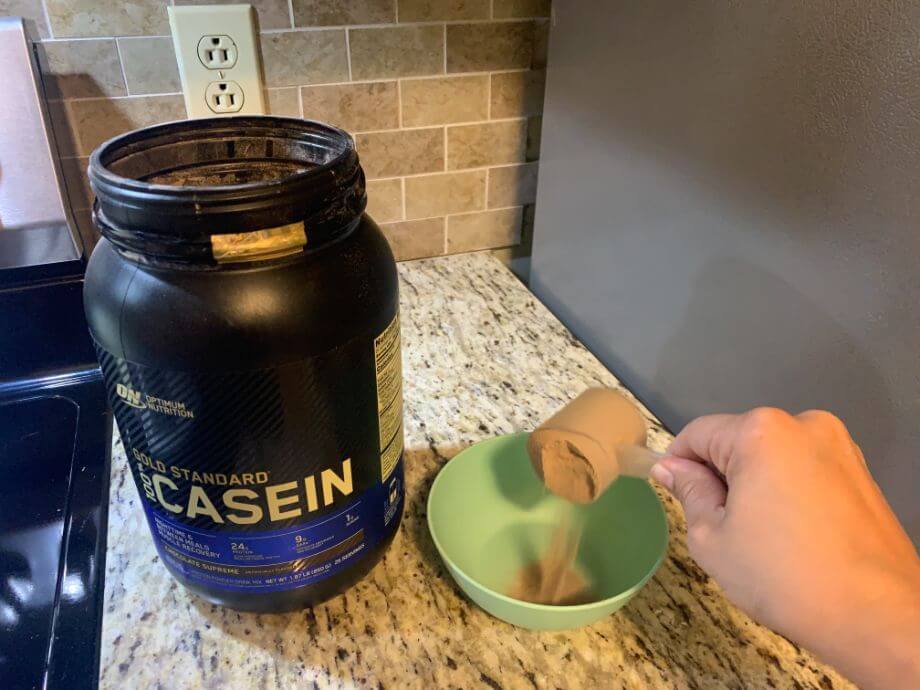
Both casein and whey are complete proteins because they provide all nine essential amino acids, including branched-chain amino acids (BCAAs). These essential amino acids are namely essential to any diet, as the human body doesn’t naturally produce them like non-essential amino acids, and BCAAs benefit your muscle-building and fitness goals.
In cow’s milk, casein protein exists as casein micelles—also known as micellar casein—that are tiny, naturally-formed aggregates considered the least processed version of casein. Adding acids or enzymes, often during cheese production, causes the casein to coagulate into curds and separate from the liquid whey.
Detecting that casein coagulates into curds and whey is left as the watery liquid can ease your understanding of the key differences between the two, especially regarding their absorption rate and solubility.
What’s the Difference Between Casein and Whey?
When examining casein protein vs whey, the most significant differences between these two types of protein include the following:
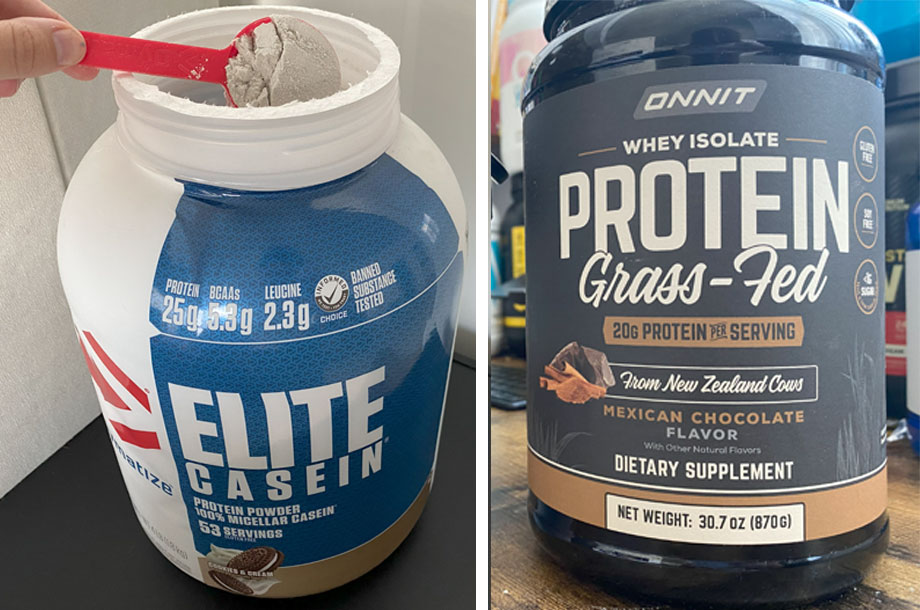
- Absorption rate: Whey protein is fast-acting and absorbed quickly, whereas casein is a slow-digesting protein. But if produced into casein hydrolysate, or hydrolyzed casein, a randomized controlled trial1 suggests the amino acids may be digested and incorporated into skeletal muscle protein more quickly.
- Amino acid profile: While both milk proteins contain all essential amino acids, a 2019 study2 shows casein protein has a higher amount of glutamine. However, whey protein has a slightly higher concentration of the branched-chain amino acids leucine and isoleucine.
- Solubility: Whereas whey protein (the watery liquid) is water soluble and mixes well with water, casein (the coagulated curds)—is not water soluble and does not mix as well.
- Price: Casein protein is often costlier than whey protein powders, although the benefits of casein protein may sway the slight splurge.
7 Benefits of Casein Protein
As a high-quality, nutrient-dense source of protein, casein offers impressive benefits with the research to back it. From improving athletic performance to bone health to body composition, let’s dive into the benefits of casein protein.
1. Provides Essential Amino Acids and Nutrients
As mentioned, casein protein supplies all nine essential amino acids that must be consumed from whole food sources. But beyond its rich amino acid profile, casein provides other essential vitamins and minerals.
The proof is in the casein pudding (IYKYK—but also see benefit #7), as one scoop of the single-ingredient Naked Nutrition Micellar Casein Protein Powder provides:
- Calcium: 618 mg (48% DV)
- Phosphorus: 390 mg (39% DV)
- Magnesium: 29 mg (7%)
The casein protein powder also provides smaller amounts of iron, potassium, and sodium.
2. Enhances Muscle Growth and Strength
Two of the most well-known (and sought-after) benefits of protein are its ability to enhance muscle growth and recovery, casein protein included. However, primarily because of its richer leucine content, whey protein is often touted as the superior choice to build muscle.
Recall that leucine is a branched-chain amino acid3 (BCAA)—an essential amino acid mostly metabolized in skeletal muscle—that promotes an anabolic environment and is anti-catabolic. Research4 shows about 3 to 4 grams of leucine per serving can maximize protein synthesis, and another study5 suggests taking whey protein post-workout improves muscle protein synthesis more than casein.
But let it be known that research published in Medicine & Science in Sports & Exercise6 shows casein and whey protein increase muscle protein synthesis, despite differences in blood amino acid responses. Another study7 helps confirm this, suggesting that post-exercise intake of whey or casein proteins is beneficial, and each provides significant strength gains for leg and bench presses.
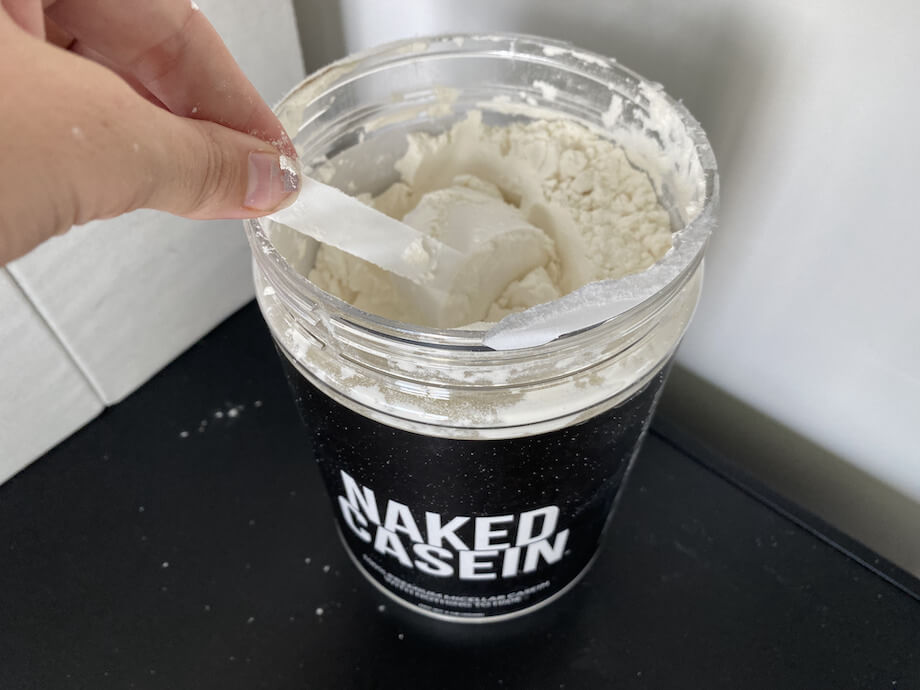
3. Facilitates Muscle Recovery
Leaning on the best muscle recovery supplements is essential for both recovery and growth, and you shouldn’t sleep on casein protein’s long-lasting anabolic properties.
A 2020 systematic review published in Physical Activity and Nutrition8 presents that consuming at least 40 grams of casein protein—following an evening resistance training session and about 30 minutes before bed—may facilitate muscle recovery.
4. Augments Sports Performance
Creatine might be the most effective and popular ergogenic aid, however casein protein—and protein in general—can also augment sports performance.
Research7 indicates that combining casein with resistance training provides favorable changes in performance, particularly in anaerobic exercise with an emphasis on power and agility. And when comparing casein and whey protein, no significant performance-enhancing differences are noted.
The International Society of Sports Nutrition9 (ISSN) encourages endurance athletes to achieve adequate carbohydrate intake to promote optimal performance. While the ISSN calls out that there’s little investigation on the effects of protein supplementation on endurance performance, they urge that protein is still prudent to reduce muscle damage and soreness.
5. Improves Body Composition
While both milk proteins can significantly improve body composition, casein shows to reduce calorie intake more than whey7 and may have the upper hand for fat loss. And the slower absorption of casein helps enhance satiety and suppress appetite for a longer period of time, moderating calorie ingestion and aiding weight loss efforts.
However, most (if not all) of these body composition benefits are mostly attributed to sufficient protein intake. So whether you’re looking to build muscle mass or lower body fat, don’t sleep on protein—casein or not—and resistance training.9
6. Offers Full-Body Benefits
Beyond helping you reach your fitness goals, casein protein provides full-body benefits such as:
- Supporting strong bones and teeth: A review in the Journal of the American College of Nutrition10 suggests that casein supplementation reduces post-fracture bone loss, and research published in Caries Research11 even hints that casein and casein-derived proteins reduce or prevent enamel erosion.
- Lowering blood pressure: A 2022 meta-analysis and systematic review12 shows that casein, particularly hydrolysate, reduces blood pressure.
- Improving metabolic health: A review in Nutrition & Metabolism13 suggests that dairy components, including casein, may benefit metabolic health. Moreover, greater dairy intake is associated with lower metabolic-related disorders and cardiovascular disease risk.
Based on a 2016 comprehensive review14, milk proteins may reduce risk factors for cancer, cardiovascular diseases, and other chronic health conditions. They may also bolster immunity, reduce inflammation, and improve overall health.
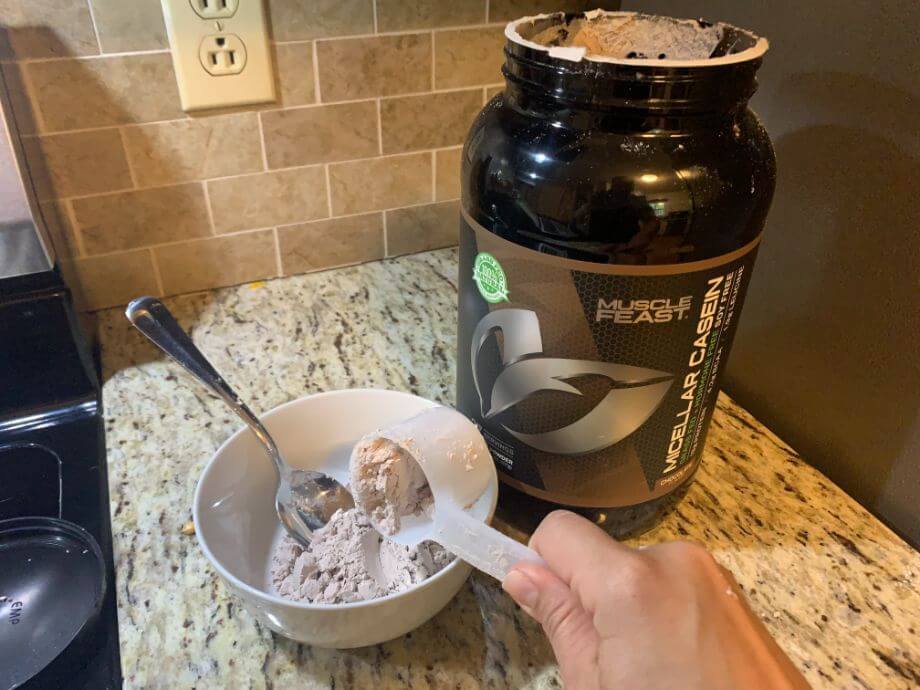
7. Makes a Convenient and Versatile Protein Source
Shelf-stable and easily transported, casein protein supplements make one convenient (and versatile) protein source. Of course, dietary supplements should supplement a balanced diet, but there’s less worry about wasting spoiled milk!
And if you’re bored with your post-workout protein shake, use protein powder creatively—like blended into smoothies, baked into brownies, and stirred into yogurt. The thicker consistency of casein powder also makes it the best option for protein pudding; simply mix it with enough milk until you reach the desired consistency. (So if you didn’t already know, now ya know—see benefit #1!)
Are There Downsides and Side Effects of Casein Protein?
The benefits of casein protein are compelling, but some downsides are worth noting. First and foremost, people with a milk allergy should avoid the milk protein and would fare better with a non-dairy, vegan protein powder.
But milk allergies should not be confused with lactose intolerance—the inability to digest lactose (a milk sugar) due to a deficiency in lactase (the enzyme that breaks down lactase). Casein15 might be a tolerable option for individuals with lactose intolerance, as lactose and other milk constituents are removed during processing, but it’s still smart to consume cautiously.
When Should You Take Casein Protein?
Commonly referred to as the nighttime or bedtime protein, a systematic review16 recaps that pre-sleep casein supplementation promotes satiety overnight, augments protein synthesis, enhances muscle size and strength, and improves recovery. And when pre-sleep casein is combined with resistance training, the muscular benefits are even more remarkable.
Despite these evidence-based advantages of pre-sleep casein, the study calls out that overall protein intake significantly decreases the rate of total body protein breakdown. Moreover, casein alone has a lower effect on appetite compared to mixed formulations with carbs and fat.
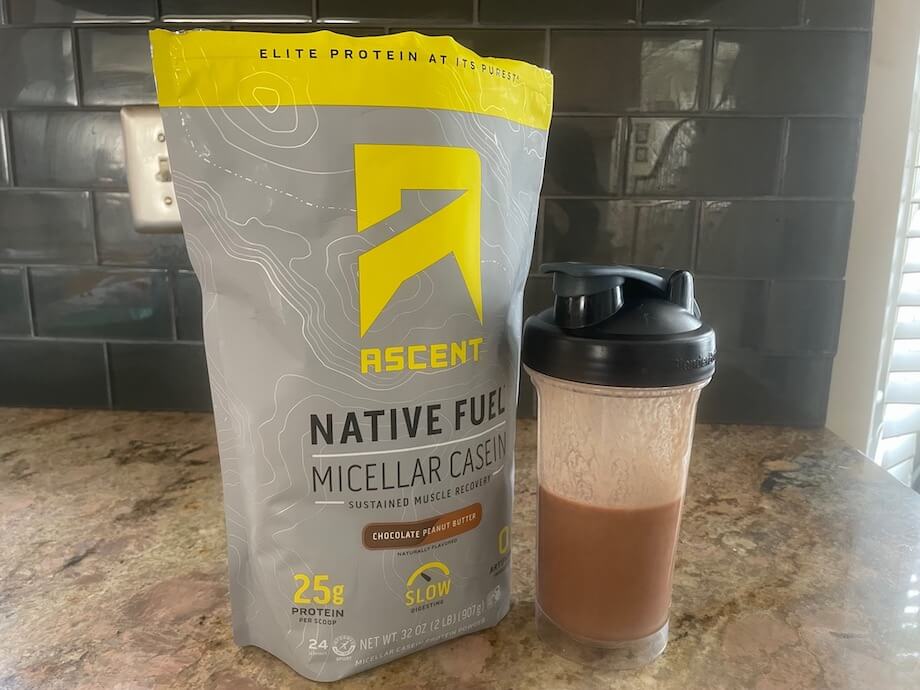
Unless you have specific dietary needs and goals, these data points remind us to consistently eat enough protein rather than solely focusing on when to take a single source. Fixating on the granular details can distract from the bigger picture: consuming a balanced diet with nutrient-dense carbs, healthy fats, and high-protein foods.
And now if you’re wondering, “How much protein do I need?” GGR senior staff writer Amanda Capritto has you covered. Still, we encourage you to consult a dietitian or healthcare professional to help determine how many grams of protein you should aim for daily (and identify any potential interactions or adverse side effects).
Benefits of Casein Protein: Final Thoughts
Casein is a high-quality, slow-digesting protein with research-backed benefits, including:
- Provides all essential amino acids and nutrients—like calcium, phosphorus, and magnesium
- Enhances muscle growth and strength, with research backing it to be as beneficial as whey protein
- Facilitates muscle recovery, including after an evening resistance training session and before bed
- Improves body composition, particularly aiding muscle growth and fat loss
- Offers full-body benefits—such as supporting bone, metabolic, and heart health
- Makes one convenient and versatile protein source, primarily when used in powder form
So while we might still not know if Little Miss Muffet finished her curds, we hope you now know the impressive benefits of casein protein—and don’t sleep on them!
Benefits of Casein Protein: FAQs
Is casein better than whey protein?
While both milk proteins can leverage your fitness goals and health, casein protein can be a great alternative to whey protein if you are lactose intolerant. But if you prefer an easily-dissolvable protein shake, whey may be the way to go.
Is casein protein good or bad for you?
Unless you have a casein or milk allergy, casein protein is considered a safe, high-quality protein source with favorable fitness-related and full-body benefits.
Should I take casein protein every night?
Taking casein protein every night is likely unnecessary if you’re already getting adequate protein with high-protein foods. But to help fill in any nutritional gaps and potentially reduce nighttime hunger and cravings, pre-sleep casein supplementation can be advantageous.
Does casein build more muscle than whey?
While some evidence5 shows taking whey protein after resistance training drastically improved muscle protein synthesis compared to casein, other research7 suggests there’s no superior response between the two. Overall, building more muscle relies on consuming adequate protein—regardless if it’s whey or casein.
These statements have not been evaluated by the Food and Drug Administration. This product is not intended to diagnose, treat, cure, or prevent any diseases.
References
- Koopman R, Crombach N, Gijsen AP, et al. Ingestion of a protein hydrolysate is accompanied by an accelerated in vivo digestion and absorption rate when compared with its intact protein. Am J Clin Nutr. 2009 Jul;90(1):106-15. doi: 10.3945/ajcn.2009.27474. Epub 2009 May 27. PMID: 19474134.
- Liu J, Klebach M, Visser M, et al. Amino Acid Availability of a Dairy and Vegetable Protein Blend Compared to Single Casein, Whey, Soy, and Pea Proteins: A Double-Blind, Cross-Over Trial. Nutrients. 2019;11(11):2613. Published 2019 Nov 1. doi:10.3390/nu11112613
- Platell C, Kong S, McCauley R, et al. Branched‐chain amino acids. J Gastroenterol Hepatol. 2000;15(7):706-717. doi:https://doi.org/10.1046/j.1440-1746.2000.02205.x
- Stark M, Lukaszuk J, Prawitz A, et al. Protein timing and its effects on muscular hypertrophy and strength in individuals engaged in weight-training. J Int Soc Sports Nutr. 2012 Dec 14;9(1):54. doi: 10.1186/1550-2783-9-54. PMID: 23241341; PMCID: PMC3529694.
- Tang JE, Moore DR, Kujbida GW, et al. Ingestion of whey hydrolysate, casein, or soy protein isolate: effects on mixed muscle protein synthesis at rest and following resistance exercise in young men. J Appl Physiol (1985). 2009 Sep;107(3):987-92. doi: 10.1152/japplphysiol.00076.2009. Epub 2009 Jul 9. PMID: 19589961.
- Tipton KD, Elliott TA, Cree MG, et al. Ingestion of casein and whey proteins result in muscle anabolism after resistance exercise. Med Sci Sports Exerc. 2004 Dec;36(12):2073-81. doi: 10.1249/01.mss.0000147582.99810.c5. PMID: 15570142.
- Wilborn CD, Taylor LW, Outlaw J, et al. The Effects of Pre- and Post-Exercise Whey vs. Casein Protein Consumption on Body Composition and Performance Measures in Collegiate Female Athletes. J Sports Sci Med. 2013;12(1):74-79. Published 2013 Mar 1.
- Kim J. Pre-sleep casein protein ingestion: new paradigm in post-exercise recovery nutrition. Phys Act Nutr. 2020 Jun 30;24(2):6-10. doi: 10.20463/pan.2020.0009. PMID: 32698256; PMCID: PMC7451833.
- Jäger R, Kerksick CM, Campbell BI, et al. International Society of Sports Nutrition Position Stand: protein and exercise. J Int Soc Sports Nutr. 2017 Jun 20;14:20. doi: 10.1186/s12970-017-0177-8. PMID: 28642676; PMCID: PMC5477153.
- Bonjour JP. Dietary protein: an essential nutrient for bone health. J Am Coll Nutr. 2005 Dec;24(6 Suppl):526S-36S. doi: 10.1080/07315724.2005.10719501. PMID: 16373952.
- White AJ, Gracia LH, Barbour ME. Inhibition of dental erosion by casein and casein-derived proteins. Caries Res. 2011;45(1):13-20. doi: 10.1159/000322300. Epub 2010 Dec 11. PMID: 21160185.
- Zhou S, Xu T, Zhang X, Luo J, et al. Effect of Casein Hydrolysate on Cardiovascular Risk Factors: A Systematic Review and Meta-Analysis of Randomized Controlled Trials. Nutrients. 2022;14(19):4207. Published 2022 Oct 9. doi:10.3390/nu14194207
- McGregor RA, Poppitt SD. Milk protein for improved metabolic health: a review of the evidence. Nutr Metab (Lond). 2013 Jul 3;10(1):46. doi: 10.1186/1743-7075-10-46. PMID: 23822206; PMCID: PMC3703276.
- Davoodi SH, Shahbazi R, Esmaeili S, et al. Health-Related Aspects of Milk Proteins. Iran J Pharm Res. 2016;15(3):573-591.
- Raak N, Corredig M. Caseins, Caseinates and Micellar Casein. Encyclopedia of Dairy Sciences. Published online 2022:8-17. doi:https://doi.org/10.1016/b978-0-12-818766-1.00135-5
- Dela Cruz J, Kahan D. Pre-Sleep Casein Supplementation, Metabolism, and Appetite: A Systematic Review. Nutrients. 2021 May 30;13(6):1872. doi: 10.3390/nu13061872. PMID: 34070862; PMCID: PMC8229753.


